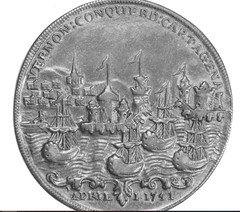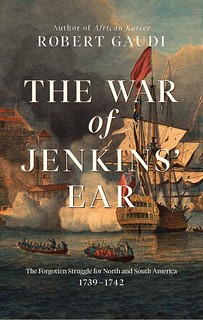
Gerry Tebben writes:
"I love how numismatics can lead down a rabbit hole. A book review in Saturday's Wall Street Journal recounts how author Robert Gaudi's chance encounter with a 1741 medal in a Georgetown flea market led to his researching the life of Admiral Edward Vernon. Gaudi didn't buy the medal, but he did write a book about Vernon, the wonderfully named "The War of Jenkins' Ear."
"The review is illustrated with a massive (6.5 inches in diameter) photo of a VERNON CONQUERED CARTAGENA medal. (Robert Jenkins, by the way, was a suspected smuggler who, the review helpfully explains, "lost an ear while undergoing interrogation.")"
Thanks - here's an excerpt from the article. It's always nice to see numismatics reflected in the mainstream media, even when it's just in passing.
-Editor
 Browsing Georgetown Flea Market in Washington, D.C., writer Robert Gaudi chanced upon an old medal that piqued his curiosity. Keen to clinch a deal, the stall-holder was quick to emphasize that the tarnished item had
Browsing Georgetown Flea Market in Washington, D.C., writer Robert Gaudi chanced upon an old medal that piqued his curiosity. Keen to clinch a deal, the stall-holder was quick to emphasize that the tarnished item had some age on it, a sales pitch that Mr. Gaudi soon discovered to be something of an understatement. An online search revealed the medal to be one among many variants struck to commemorate Adm. Edward Vernon, the hero of a largely forgotten colonial war waged between Britain and Spain from 1739 to 1742.
Although Mr. Gaudi declined to buy the medal, the discovery inspired his lively, sprawling and sometimes irreverent book about the conflict in which Vernon won fame, The War of Jenkins' Ear. That curious title was only coined long after the last veteran was dead: British historian Thomas Carlyle first suggested the term in a footnote to his 1858 biography of Frederick the Great of Prussia, and the name stuck.
The incident in which suspected smuggler Capt. Robert Jenkins of the merchant ship Rebecca lost an ear while undergoing interrogation off Havana by coast guard Juan de León Fandiño occurred in 1731. Years later the brutal episode was recalled as trading rivalries between Britain and Spain escalated. Whether Jenkins ever lobbied Parliament for redress, brandishing a jar containing his pickled ear, is debated by historians. But cartoons and ballads show that his sufferings were used as propaganda by Britons eager for war with Spain, seen as a declining power whose empire offered easy pickings.
In an opening move, the hawkish Vernon was sent to raid Porto Bello, in what is now Panama. The news that Vernon had fulfilled his bold boast to capture his objective with six ships only prompted wild celebrations in Britain and her North American colonies, making him a figurehead for opponents of the pacifistic prime minister Sir Robert Walpole.
Vernonmania gave rise to commemorative medals and pottery, and coincided with the first performance of what would become Great Britain's unofficial national anthem, Rule, Britannia. Communal bonfires and heavy drinking fuelled demands for an all-out onslaught upon Spanish America. Walpole reluctantly authorized a powerful task force, although he gloomily predicted that the joyful ringing of bells would be followed by a mournful wringing of hands.
 British America was expected to participate, and 4,000 colonial recruits were mustered into a new
British America was expected to participate, and 4,000 colonial recruits were mustered into a new American Regiment. Its officers included 22-year-old Capt. Lawrence Washington, elder half-brother of future president George. The expedition's initial target was the port-city of Cartagena, in modern Colombia. Despite delays that gave the defenders time to prepare, Vernon's warships penetrated the narrow Boca Chica passage leading to the inner anchorage.
Reports of this success reached London in May 1741, prompting yet more triumphalist memorabilia. The medal that caught Mr. Gaudi's eye was struck to mark Vernon's conquest of Cartagena, depicting the admiral receiving the city's surrender from a kneeling Spaniard, identified as Don Blass. This was wishful thinking. Far from submitting, Cartagena's commander, Don Blas de Lezo y Olavarrieta, galvanized a stubborn resistance. Nicknamed El Medio (Half Man ) because he had already lost a leg, an arm, and an eye fighting for his country, Don Blas was loath to bend his remaining knee to anyone.
To read the complete article (subscription required), see:
‘The War of Jenkins' Ear' Review: The Lobe Heard Round the Globe
(https://www.wsj.com/articles/the-war-of-jenkins-ear-review-the-lobe-heard-round-the-globe-11641572005)
To read earlier E-Sylum articles, see:
NEW BOOK: MEDALLIC PORTRAITS OF ADMIRAL VERNON
(https://www.coinbooks.org/esylum_v13n16a05.html)
BOOK REVIEW: MEDALLIC PORTRAITS OF ADMIRAL VERNON
(https://www.coinbooks.org/esylum_v13n33a05.html)
BOOK REVIEW: MEDALLIC PORTRAITS OF ADMIRAL VERNON
(https://www.coinbooks.org/esylum_v13n34a08.html)
Wayne Homren, Editor
The Numismatic Bibliomania Society is a non-profit organization
promoting numismatic literature. See our web site at coinbooks.org.
To submit items for publication in The E-Sylum, write to the Editor
at this address: whomren@gmail.com
To subscribe go to: https://my.binhost.com/lists/listinfo/esylum
Copyright © 1998 - 2024 The Numismatic Bibliomania Society (NBS)
All Rights Reserved.
NBS Home Page
Contact the NBS webmaster
|




